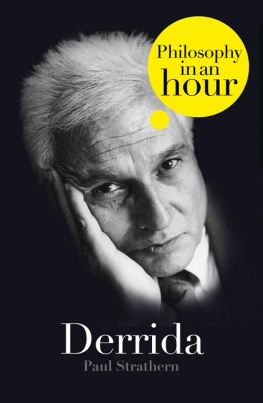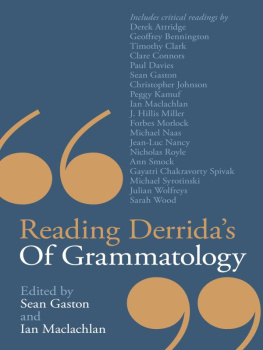Of Grammatology
Of Grammatology
J ACQUES D ERRIDA
Fortieth Anniversary Edition
Translated by Gayatri Chakravorty Spivak
Introduction by Judith Butler
Johns Hopkins University Press
Baltimore
1974, 1976, 1997, 2016 Johns Hopkins University Press
All rights reserved. Published 2016
Printed in the United States of America on acid-free paper
9 8 7 6 5 4 3 2 1
First American edition, 1976
Originally published in France under the title De la Grammatologie
Copyright 1967 by Les Editions de Minuit
Johns Hopkins University Press
2715 North Charles Street
Baltimore, Maryland 21218-4363
www.press.jhu.edu
Library of Congress Cataloging-in-Publication Data
Derrida, Jacques, author.
[De la grammatologie. English]
Of Grammatology / Jacques Derrida ; Translated by Gayatri Chakravorty Spivak ; Introduction by Judith Butler. Fortieth Anniversary Edition.
pages cm
Originally published in France under the title De la Grammatologie Copyright 1967 by Les Editions de Minuit.
Includes bibliographical references and index.
ISBN 978-1-4214-1995-4 (pbk. : alk. paper) ISBN 1-4214-1995-5 (pbk. : alk. paper)
ISBN 978-1-4214-1996-1 (electronic) ISBN 1-4214-1996-3 (electronic)
1. Language and languagesPhilosophy. 2. Writing. I. Spivak, Gayatri Chakravorty, translator. II. Title.
P105.D5313 2015
401dc23
2015034844
A catalog record for this book is available from the British Library.
Special discounts are available for bulk purchases of this book. For more information, please contact Special Sales at 410-516-6936 or specialsales@press.jhu.edu.
Johns Hopkins University Press uses environmentally friendly book materials, including recycled text paper that is composed of at least 30 percent post-consumer waste, whenever possible.
CONTENTS
INTRODUCTION
Judith Butler
At the word go we are within the multiplicity of languages and the impurity of the limit.
JACQUES DERRIDA , What Is a Relevant Translation?
In 1967 Derrida published three ground-breaking works in French: De la grammatologie, La voix et le phnomne, a study of Husserls theory of signs ( Speech and Phenomena, translated by David B. Allison in 1973), and Lcriture et la diffrence ( Writing and Difference, translated by Alan Bass in 1978). When Of Grammatology was translated and published in English in 1976 by Gayatri Chakravorty Spivak, it sparked an enormous interest in Derrida that had not been widely shared outside of a small group of scholars familiar with his work in French and a few available English translations of his essays. In a way, the English translation of 1976 gave birth again to the 1967 French text ex post facto . The critical attention given to the translation surely reflected an anxiety about how Derrida would be received in English, but also about which version of Derrida would become known or knowable as a result.
There were at least two different ways that the question of whether or not Derrida would be readable in English came to the fore: (1) Could he be read, given the challenges he delivered to conventional protocols of reading?, and (2) Could he be read, given that the English version failed to capture in every detail the key terms and transitions of the original French? The answer to the first question depends in large part on whether those who police the conditions and terms of readability would be able to recognize the critical challenge to their own conventional ways of proceeding. In some ways, it is an empirical question, if not a psychological one, and so the publication of the text was a wager: Would they follow? Would they agree to follow? Would they shut out or shut down a way of reading that called into question what it means to follow a text in whatever direction it The reciprocal and ongoing way that a translation acts upon both languages suggests that the translation does not simply arrive on the date of publication: that arrival is ongoing, uneven, and incomplete. Indeed, we find ourselves now, at the moment of this writing or your reading, at another such moment of arrival. Dates have something to do with this open-ended process, but they cannot explain that open-endedness.
Moreover, these ongoing transformative effects are more important for understanding the task of the translator than any mimetic or moral demand for fidelity, especially since it is not always within the control of the translator to produce those effects. They arise as much from the decisions of any individual as from the predicament of the interlinguistic encounter. It is always hard to be faithful when the terms of the encounter are unclear. One language cannot sound like another, and even if it did, it would not necessarily convey the text across the linguistic boundary (resemblance on the basis of sound can create faux amisfalse, disloyal, and faithless friends). So should we be concerned if the English strays off from the French, or is this very straying off part of the necessary detour taken by those who seek to translate such a difficult and monumental text from one language to another without the ideal of restoring the original in a second language? If the problem of writing, the central problem of Of Grammatology, depends on a generative collapse of the mimetic ideal mandating that writing reiterates the sounds of speech, and if translation engages this same problemthe generative collapse of mimesisthen we should perhaps check the inevi What is lost, what lives on, and how does that living on happen? Is this translation Of Grammatology not a way of living on, mournful and strangely persistent?
When Derrida himself considers the conditions and limits of translation, he points out that homophones or homonyms, two words that sound (or look) the same but bear quite different meanings in different languages, show that it is not possible to translate word-to-word ( CI 2001, 181). In his article What Is a Relevant Translation?, he writes that whenever several words occur in one or the same acoustic or graphic form, whenever a homophonic or homonymic effect occurs, translation in the strict, traditional, and dominant sense of the term encounters an insurmountable limitand the beginning of its end, the figure of its ruin. Then he adds in parentheses that seem to bear an inverse relation to the claim they contain, (but perhaps a translation is devoted to ruin, to that form of memory or commemoration that is called a ruin; ruin is perhaps its vocation and a destiny that it accepts from the very outset) ( CI 181). His suggestion is couched in the perhaps and sequestered in parentheses, yet the claim is hardly made any smaller by those signs of reticence. One might say that one translation or another ruins the original, and lament that fact, but if ruin is there from the start of any translation, its condition of both possibility and of failure, then so, too, is lamentation. In What Is a Relevant Translation? he takes up the relevance of translation, only to turn his attention to the different senses that relevance bears in French, German, and English. The word sure looks French, but relever, which in French means variously to take up or even to preserve or to elevate, both loses and gains connotations as it floats between several languages ( CI 181). He remarks upon the challenge to every translation that would like to welcome into another language all the connotations that have accumulated in this word [ relever ]. Those connotations have become innumerable in themselves, perhaps unnameable: more than one word in a word, more than one language in a single language, beyond every possible compatibility of homonyms ( CI 19899).
If ruin is there from the word go, then so, too, is mourning, prior to any nameable loss, which is surely why Derrida confirms that translation is a work of mourning ( CI 199), more of a task than a given. At the same time, point to the trace at the beginning moment of the sequence without that pointing becoming a problem than we can establish the trace as a kind of being without accounting for how that ontological field is constituted. The trace that lets us refer to the past is not continuous with that past, nor is it a kind of being. It can only be understood through another key concept, that of diffrance, spelled with the a, marking an interval irreducible to any prior synthesis or continuity.
Next page









